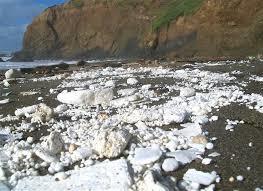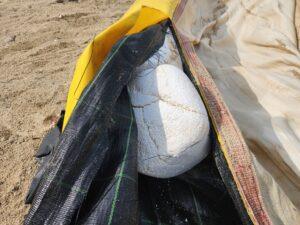Silt curtains are, and will continue to be, an essential component of marine construction and dredging projects, used to contain and control sediment in the water.

However, we are seeing a growing trend towards low cost, low quality silt curtains that are designed for a single use and not with performance or longevity in mind.
Ironically, more often than not, they’re being sold as heavy duty but are in reality a downgraded specification of what the same curtain used to be. This “shrinkflation” (as you often see in food packaging where the packaging size remains the same but the contents inside shrink) is sometimes achieved by creation of a new superior product name such as “Type III Heavy Duty” or “Type III Heavy Duty Plus. The original “Type III” model is then given this new name, and a new lower quality version is given the standard “Type III” name.
Single use silt curtains are a significant source of environmental waste. Additionally, using low quality silt curtains that deteriorate after a short span of time also considerably add to environmental waste. After each project, used or damaged curtains are transported to landfills, resulting in additional costs for clients and significant environmental harm.

The Financial Costs of Single Use or Low-Quality Silt Curtains
The cost of transporting used silt curtains to landfills can add up quickly, especially for large construction projects. The cycle of buying and discarding silt curtains is not only environmentally damaging but also financially expensive. Additionally, there’s the added cost in disposing these curtains per tonne.
For clients, the cost of single-use silt curtains goes beyond transportation and disposal fees. The constant need to replace curtains after each project results is a significant financial burden, especially for organizations that undertake multiple projects each year. Additionally, the loss or damage of silt curtains during transit or storage can result in additional costs for clients, further exacerbating the financial burden.
Another factor that isn’t considered is the downtime costs that occur when a project shuts down because of damaged silt curtains due to the use of low-quality materials or the wrong product being installed for the environmental conditions. For small worksites and shore-based reclamation, downtime costs can on average be $3000 per day. For large operations such as offshore trailing suction hopper dredges, it can be a massive $10,000-15,000 per hour.
The Environmental Costs of Single Use or Low-Quality Silt Curtains
In addition, we are increasingly being called in to replace damaged silt curtains that clients have procured from other sources. We are seeing a couple of re-occurring issues:
- the product is not fit for purpose for the environmental conditions
- the product uses low quality materials
- the materials used do not match the specifications that were purchased.

By low quality we generally mean using materials that are not sufficient specification for the environment they are being used in.
It is crucial to check the materials used in production when ordering silt curtains and ensuring that the materials delivered match the product specifications purchased. All these issues are easily avoidable, but if not considered in the procurement process, lead to reduced performance and risk of product failure or project shutdown. The result is environmental damage, not to mention added financial cost to the project.
Just because you make a marine protection product and talk about protecting the marine environment, doesn’t mean you are in fact doing good for the environment
When a silt curtain fails, it stops performing as it is designed – that is, it stops protecting the marine environment. In fact, it can create more environmental harm than it is designed to protect. Damage to the silt curtain caused by improper product selection or low quality materials further exacerbates damage. For example, when low quality EPS is used this leads to it crumbling into micro beads. Should a silt curtain tear, those micro beads will leak into the water releasing toxins into marine ecosystems that contaminate drinking water and also adversely affect marine life.

The Solution: Fit-for-Purpose Silt Curtains
To ensure the effectiveness of silt curtains, it’s crucial to customize, design, and manufacture them with consideration for the unique environmental conditions of their intended location. Rather than relying solely on datasheets and standards which should not be used as a decision-making tool, it’s essential to evaluate the right data and ensure high-quality materials are used to build the right product. In addition, quality checks onsite to verify the product specifications is critical to ensure what you purchased matches what you were delivered.
Finally, fit-for-purpose silt curtains also factor in the right installation and maintenance required, further contributing to their longevity and preventing costly damage or frequent maintenance. The right removal of these curtains can also minimize damage and increase chances of re-use, allowing for diversion from landfills.
By investing in fit-for-purpose silt curtains that are designed for project-specific environmental conditions and not just relying on datasheet specifications blindly, clients can save money in the long run. While the initial cost may be higher than single-use options, these customized silt curtains made of durable materials can withstand the demands of multiple projects, reducing transportation, disposal, and replacement costs.
For your next project, make your silt curtain decision based on what is best for the project environment and consider the long-term financial and environmental cost benefits associated with buying for longevity.
Looking for the right silt curtains for your project, visit ecocoast.com/contact-us today!
Further Information
Our ESC datasheets can be downloaded on the product page: Ecobarrier Silt Curtains.










